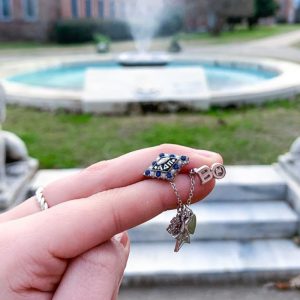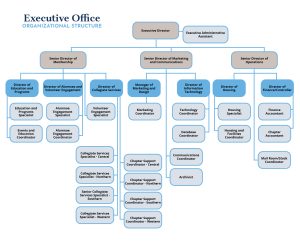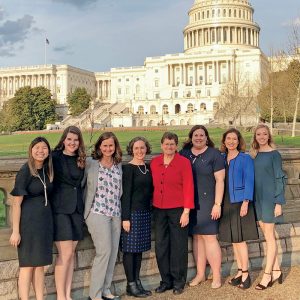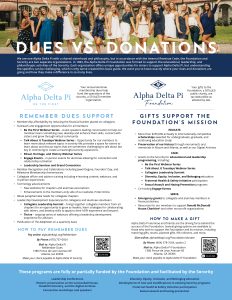We acknowledge that being a member of Alpha Delta Pi is a financial commitment, and we are happy you have chosen to join. In order to better explain why dues are a necessity, we created this overview for members and their families to better understand how their money is used. Alpha Delta Pi’s leadership wants members to feel excited and empowered to seek out the many amazing opportunities that are available through membership in the sorority. If you at any point have any questions, please do not hesitate to reach out to info@alphadeltapi.com.
This page contains an exhaustive review of Alpha Delta Pi policies and practices with regard to finance on the local and international level. If you are interested in organizational financial transparency, we encourage you to read this page in its entirety and in order, so you receive the full picture of non-profit management, the local and international budgeting process, and why money is allocated to the expenditures described.
The Value of ADPi: Are You Paying for Your Friends?
 The question of whether or not Greek life is just “paying for your friends” is one that has been asked thousands of times over the years. It’s been answered just as many times by those within the community – some responses are more eloquent than others. To take a deeper dive into the value of ADPi, one must first understand the concept of a not-for-profit membership organization.
The question of whether or not Greek life is just “paying for your friends” is one that has been asked thousands of times over the years. It’s been answered just as many times by those within the community – some responses are more eloquent than others. To take a deeper dive into the value of ADPi, one must first understand the concept of a not-for-profit membership organization.
Membership Organizations
Under IRS Code Section 501(c)(7) non-profit classification for social and recreational clubs, fraternities and sororities are recognized as tax-exempt organizations, which means we do not pay federal taxes. Non-profit membership organizations are groups that provide benefits and services to their members, usually focused on a certain cause or goal such as religious, charitable, educational, political, etc. These organizations, as registered non-profits, do not obtain their operating funds by selling products or services to individuals; they rely on membership dues – and/or donations – to fund their activities. Some membership organizations provide more benefits than others, depending on their mission and vision, and structure their dues accordingly.
Here are some of the largest and most recognizable membership organizations in the United States:
- Professional
- American Chemical Society
- National Education Association
 Special Interest
Special Interest
- AARP (American Association of Retired Persons)
- American Diabetes Association
- National Audubon Society
- National Wildlife Foundation
- Sierra Club
- Girl Scouts/Boy Scouts
- Fraternal
- Lions, Elks, Shriners, Civitan, Kiwanis, Freemasons
- Greek-letter organizations (NPC, IFC, NPHC, MCGC, etc.)
- Women’s Organizations
- Collegiate sororities
- Junior League
- NOW (National Organization for Women)
- DAR (Daughters of the American Revolution)
- YWCA (Young Women’s Christian Organization)
- League of Women Voters
All these organizations have one thing in common: they are non-profit, membership-based groups that rely on some form of dues to maintain operations and offer benefits to their members. Membership is voluntary and not required by any government or professional entity in order to exercise your rights as a citizen or employee of any company. Members must decide for themselves if the benefits received are worth the financial obligations of belonging.
Membership Benefits
Whereas most for-profit businesses offer products (like retail companies) or individually specific services (like legal services) to customers or clients, most non-profit membership organizations offer benefits and opportunities to members. These benefits can include discounts
and price breaks on goods and services from affiliate partners (AARP offers these discounts as a primary membership benefit), professional networking opportunities and continuing education (ACS, NEA, and others offer national conventions for meeting colleagues and learning), access to insider research and information, opportunities for group activism or volunteering, and social networking. All these organizations center their work, recruitment, and operations around a set of common goals based on their vision and mission. These actions are then carried out through a combination of paid staff work and volunteer time and effort.
So, What Benefits Does ADPi Provide Its Members?
 The benefits of ADPi membership tie directly back to our vision and mission as defined by Grand Council in 2020.
The benefits of ADPi membership tie directly back to our vision and mission as defined by Grand Council in 2020.
Vision: A sisterhood dedicated to lifelong personal growth and friendship.
Mission: To provide women with a meaningful lifelong member experience that empowers them to reach their full potential through leadership, educational, philanthropic, and social opportunities.
Pulling keywords from these statements, below are just a few of the benefits of membership in Alpha Delta Pi:
Sisterhood. As a women’s organization, Alpha Delta Pi provides a place for members to associate with others who share their lived experiences, values, and aspirations. In remaining a place for women’s empowerment, members will find a safe space to work together toward common goals and the advancement of women’s leadership. Our ritual ties us all together as sisters across the world and guides us as we live for each other.
Lifelong. Alpha Delta Pi is not for four years, it’s for life. Unlike most other national membership organizations, ADPi members are required to pay only while they are collegians – a maximum of four years. After that, their membership and the benefits of membership continue, even if they choose not to participate in our voluntary alumnae dues program. ADPi friendships, opportunities for education, and benefits do not end at college graduation.
Personal Growth. As women, as humans, we never stop growing. Alpha Delta Pi provides programming and leadership opportunities for collegians and alumnae that guide this growth. Whether a woman participates in an educational webinar or series, takes on a collegiate officer position, or steps up to volunteer as an alumna advisor or international officer, she will learn important life skills that carry beyond her ADPi membership and into her personal and professional experiences.
Friendship. The opportunities for friendship within Alpha Delta Pi extend beyond your campus. Our collegiate chapters are diverse groups comprised of members from all walks of life, providing the opportunity to find not only like-minded sisters but also those who have new perspectives and experiences to share and learn from. Friendships are built within chapters that last lifetimes. But these opportunities don’t end at graduation. Alumnae associations and volunteer positions afford additional outlets for Alpha Delta Pi members to find and cultivate friendships within the organization.
Empowers. Experience as a leader and creative thinker is a valuable skill developed within the sorority that empowers members to seek additional leadership and take new chances. Beyond opportunities for leadership and personal development, having a strong, organized group of sisters serve as a support network can be one of the most empowering feelings. A member can always find someone to answer a question, provide emotional assistance, and cheer her on through life.
 Leadership. Every Alpha Delta Pi has the opportunity to seek leadership – and leadership is not limited to holding a position as a chapter officer, advisor, or international officer. While these positions might be more structured within our system, membership offers additional leadership development through special program facilitation, conflict management, campus and professional networking, and written/digital resources available to all members. Participation and engagement in a lifetime membership organization offers countless opportunities for everyday leadership development that cannot be found outside.
Leadership. Every Alpha Delta Pi has the opportunity to seek leadership – and leadership is not limited to holding a position as a chapter officer, advisor, or international officer. While these positions might be more structured within our system, membership offers additional leadership development through special program facilitation, conflict management, campus and professional networking, and written/digital resources available to all members. Participation and engagement in a lifetime membership organization offers countless opportunities for everyday leadership development that cannot be found outside.
Educational. As the first secret society founded for women at the first institution chartered to grant four-year degrees to women, Alpha Delta Pi has been committed to education from the beginning. There’s a reason why we recruit from college and university students rather than from the general public: we can be sure our members are dedicated to education. Beyond degree-seeking learning, ADPi believes in personal education that gives our members the skills and knowledge needed to navigate their personal and professional lives with confidence and positive thinking. With staff and volunteers dedicated to this goal, Alpha Delta Pi provides structured programming in the areas of mental health, personal wellness, and others.
Philanthropic. Service to others is a primary focus for our members. Through the Alpha Delta Pi Foundation and in partnership with Ronald McDonald House Charities, ADPi chapters and alumnae associations have given more than $17,000,000 to further the mission of RMHC as it supports families in need. Chapters and associations receive guidance from staff and volunteers to raise awareness, generate funds, and conduct hands-on service for RMHC and other campus and community causes.
Social Opportunities. The word social does not always refer to late-night parties with bands, boys, and booze. Healthy social interaction with our sisters and the opportunity to meet new people through social events are core components of membership in any organization from Greek life to religious groups to service- or professional-based societies. Social events allow for networking with those you know and with those you meet for the first time. As with all other benefits of membership, these opportunities do not end at graduation. Alumnae associations offer connection with members and their own personal networks throughout their lifetimes.
Why Does It Take Money to Do These Things?
No non-profit organization can exist without a structured support network of staff and volunteers to carry out its vision and mission. All non-profits, including those whose sole purpose is charitable in nature, need dedicated, full-time employees and local volunteers to lead and guide members in meeting organizational and local chapter goals. Non-profits that function through local chapters – like sororities, scouts, and others – implement a dues structure that includes the financial obligation to the “home office” as well as the money needed to support the desired activities and programs of the local chapter. Alpha Delta Pi is no different.
The membership fees charged by the international organization are set each year by Grand Council in accordance with the bylaws of Alpha Delta Pi. These fees cover the expenses needed to provide a lifetime of benefits for over 220,000 members as noted above. Actual money is spent on travel and expenses for volunteers; licensing and development of educational programming; technology to support operations; conferences and conventions; liability insurance to cover chapter members, volunteers, and staff; maintenance of our Executive Office and Memorial Headquarters; and staff to manage organizational operations. No successful non-profit can exist without a staff of employees to ensure its continued growth and relevance.
In addition to the fees outlined in our governing documents, local collegiate chapters and alumnae associations have full autonomy to develop their own budgets for the activities and programming they deem important. Guidance is provided by volunteers and staff, but ultimate ownership of income and expenditures remains at the local level and is voted on by each chapter and association annually. Local dues vary greatly across the organization and are dependent upon housing obligations, recruitment needs, philanthropic efforts, and desired social events as well as other line items.
How Are We Different?
 College students today have countless options for getting involved on campus depending on their interests – religious, sports, political, activism, lifestyle, and others. The vast majority offer a four-year experience, but not all provide opportunities for networking outside the university or beyond graduation. Greek life provides an established system with guidance on furthering organizational visions and missions well beyond a member’s graduation.
College students today have countless options for getting involved on campus depending on their interests – religious, sports, political, activism, lifestyle, and others. The vast majority offer a four-year experience, but not all provide opportunities for networking outside the university or beyond graduation. Greek life provides an established system with guidance on furthering organizational visions and missions well beyond a member’s graduation.
There are no right or wrong reasons for seeking membership in Alpha Delta Pi. Some come looking for leadership and networking. Some come for personal and emotional support. Some want to gain more service and volunteer experience. Some come for the social opportunities afforded to members. Some want it all! The beauty of Alpha Delta Pi is that members can find all this and more within our sisterhood. Throw in some intramural sports, campus performance events, and real-world experience through officer positions, and you have a membership opportunity unlike any other on campus or in your community.
Back to the Original Question: Are You Paying for Your Friends?
The answer is no. As a member of an organization, you are paying for the benefits provided to members. It’s up to you how to take advantage of those benefits. Are you seeking out leadership? Are you participating in the educational programming provided by your chapter and the international organization? Are you attending all recruitment, philanthropic, sisterhood, and social events organized by the chapter? Everything in life has a value; nothing is free. What value do you place on a lifetime of personal growth, sisterhood, empowerment, and unending opportunities for leadership and education? What other organization allows you to pay for four years but remain a member – with all the benefits and privileges of membership – for the rest of your life?
Leadership Development
Be The First (Webinar Series). The Be the First Webinar Series provides space for a member to put yourself first and develop YOU in a variety of ways. Each session, a different speaker leads a conversation to help you learn something new, develop and enhance your skills, connect with sisters, and grow through virtual community.
Talk About it Tuesdays (Webinar Series). The Talk About It Tuesdays webinar series provides an opportunity for members to learn more about relevant topics in sorority life. It provides a space for sisters to learn about and discuss topics that are sometimes challenging to talk about but key in continuing to create a meaningful sorority experience. As individuals who took a pledge together to honor our motto, “We Live For Each Other,” it is important for us to never forget to lean into dialogues that make us uncomfortable, push us to look at things from new perspectives, and shine a light on real issues facing our members.
Collegiate Leadership Development. Alpha Delta Pi offers an annual leadership development experience for collegiate members. These offerings may vary each year. Experiences have included the Collegiate Leadership Summit, Officer Academy, Adelphean Compass, and Adelphean Connections. These experiences provide collegiate members an opportunity to grow as leaders, learn strategies for collaborating with others, and develop skills they can apply in professional roles beyond graduation.
 Convention. Alpha Delta Pi conventions are the supreme governing body of the sorority. Every other summer, the convention delegation, assembled of alumnae and collegiate members, gathers together for fun, sisterhood, and sorority business. The first convention was assembled in 1906 in Macon, Georgia. Leadership programming and education is also offered to attendees and may include topics relevant to women’s empowerment.
Convention. Alpha Delta Pi conventions are the supreme governing body of the sorority. Every other summer, the convention delegation, assembled of alumnae and collegiate members, gathers together for fun, sisterhood, and sorority business. The first convention was assembled in 1906 in Macon, Georgia. Leadership programming and education is also offered to attendees and may include topics relevant to women’s empowerment.
Leadership Seminar. In alternating summers between convention, Alpha Delta Pi hosts a Leadership Seminar for collegians, volunteers, and alumnae. Leadership programming and education is offered throughout the event on key topics relevant to higher education, today’s college student, and fraternal organizations. Skill and personal development programming is also offered for all attendees.
Member Education
Fraternal Health & Safety Initiative. Alpha Delta Pi is a member of the Fraternal Health and Safety Initiative. The Fraternal Health and Safety Initiative (FHSI) is designed to aid chapters of participating fraternities and sororities in achieving a high-quality membership experience. FHSI Consortium members believe violations of the fraternities’ or sororities’ policies prevent members of the chapter from reaching their potential as citizens of their host institution. FHSI Consortium members believe strongly in the betterment of men and women throughout our chapters and that we are building lifelong leaders of society. Through our FHSI membership, Alpha Delta Pi provides two programs to collegiate members: CHOICES and Hazing Prevention and Intervention.
- The CHOICES Program is an innovative alcohol abuse prevention program for college students written by Dr.’s Alan Marlatt and George Parks at the University of Washington and published by The Change Companies. This program is based upon 20 years of research funded by the National Institute of Alcohol Abuse and Alcoholism and has been recognized as an effective approach to alcohol abuse prevention for college students.
- The goal of the Hazing Prevention and Intervention Program is to engage members in a conversation starter and to be proactive in addressing positive, healthy membership experiences vested in a commitment to care for all members.
As a member of FHSI, Alpha Delta Pi chapters and members also have access to the FHSI Supplemental Resource Guide with additional exercises, planning documents, and ideas for expanding health and safety education within our chapters. Sample topics include bystander intervention, violence prevention, and active shooter/killer preparedness education.
Behind Happy Faces. Behind Happy Faces (BHF) provides a research-based curriculum using educational videos, lesson plans, and online learning to enhance the emotional development of members. The lessons have been tested on over 1 million people, incorporate research from leading social psychologists, and engage members in a proactive way. The goal of this program is to give members the tools they need to address mental health proactively by providing a more complete education of mental health, developing a more expansive vocabulary to discuss emotions, teach coping mechanisms, and the important steps to help a friend.
Diversity, Inclusion, and Belonging Training. During the 2021-2022 academic year, Alpha Delta Pi will launch Diversity, Inclusion, and Belonging training for all members. Taking a social justice approach, this course will discuss concepts such as inclusion, power, privilege, identities, and communication as well as strategies related to ally behavior, self-care, and creating inclusive spaces. By building competencies around emotional intelligence via interactive scenarios and case studies, the course will communicate to the learner the expectations of being an engaged member of a diverse and inclusive community while providing important tools to meet said expectations.
 Stop the Hazing. Alpha Delta Pi partners annually with the Max Gruver Foundation to help educate our members and spread awareness of the dangers of hazing. During National Hazing Prevention Week (NHPW), Alpha Delta Pi chapters participate in our annual Stop the Hazing campaign to spread awareness on their college campuses. NHPW is an opportunity for campuses, schools, communities, organizations, and individuals to come together and talk about hazing, raise awareness about the problem, educate others, and promote the prevention of hazing. Alpha Delta Pi joins our campuses and communities in prioritizing health and safety and provides chapters with virtual awareness opportunities, education, and opportunities to continue this important conversation.
Stop the Hazing. Alpha Delta Pi partners annually with the Max Gruver Foundation to help educate our members and spread awareness of the dangers of hazing. During National Hazing Prevention Week (NHPW), Alpha Delta Pi chapters participate in our annual Stop the Hazing campaign to spread awareness on their college campuses. NHPW is an opportunity for campuses, schools, communities, organizations, and individuals to come together and talk about hazing, raise awareness about the problem, educate others, and promote the prevention of hazing. Alpha Delta Pi joins our campuses and communities in prioritizing health and safety and provides chapters with virtual awareness opportunities, education, and opportunities to continue this important conversation.
Live Your Oath. As part of Sexual Assault Awareness Month each April and in partnership with Sigma Phi Epsilon, Alpha Delta Pi’s Live Your Oath campaign is a call to action to do our part to end college sexual assaults. This is a campaign to open conversations about consent and sexual misconduct within our chapters.
Collegiate Officer Training
Alpha Delta Pi provides ongoing training to all collegiate members serving in chapter officer positions. The collegiate officer training experience includes: First 30 Days Checklists, Leadership Transition Workshop, Pride Online Resources and Manuals, Library Courses, and live virtual trainings and meetings designed and delivered by programming directors, staff, or subject matter experts. The training offered to chapter officers ensures collegians feel equipped to fulfill the responsibilities of a leadership position but also provides skill development that can be applied in other campus leadership positions and future professional roles.
Alumnae Volunteer Training
Alumnae volunteers are a valuable and integral part of Alpha Delta Pi’s success. Alpha Delta Pi is committed to the development of all volunteers to ensure a positive experience. In an effort to help volunteers find success in their positions, Alpha Delta Pi strives to provide clear position expectations, ongoing training, consistent feedback and communication, and opportunities to learn and grow through achievement-oriented accountability. Some resources and training experiences offered for volunteers include:
- Onboarding resources, Pride Online resources
- Position Specific Operational Training
- Personal/Skill Development and training specific to working with today’s college students through experiences like the Thrive webinar series for advisors, keynote speakers, and just-in-time training
- Virtual and In-Person Training including:
- International Officer Leadership Seminar
- Advisor Training
- House Corporation Training
- Recruitment and Marketing Advisor Academy
Member Recognition and Celebrations
 Individual Awards. Individual awards are presented to both alumnae and collegiate members annually to recognize contributions to the sorority, campuses, communities, and profession.
Individual Awards. Individual awards are presented to both alumnae and collegiate members annually to recognize contributions to the sorority, campuses, communities, and profession.
Founders’ Day. A most cherished tradition of Alpha Delta Pi is the special social gathering of alumnae and collegians in recognition of May 15, 1851, the date of our founding.
Jewel Degree. In 1915, the Jewel Degree was established as an alumna degree to complete the Alpha Delta Pi Ritual. This part of our Ritual was named in honor of Jewel Davis Scarborough, who was Grand President at the time the ceremony was adopted. Jewel Degree is offered to collegiate members at the time of their graduation or to alumnae members following graduation.
Anniversary Ceremonies. Alpha Delta Pi offers milestone anniversary ceremonies for members celebrating 10, 25, 50, 60, and 75 years of membership.
Online Communities
- Alumnae
- Book Club
- Cooking Club
- Affinity Groups for members of the LGBTQ+, BIPOC, and Interfaith Communities
- Talk About It Tuesdays
- Advisors
 Collegiate chapter needs vary by campus; therefore, each chapter works through a thorough budgeting process to determine the amount of dues to collect to cover local operations based on the desired programming and activities chapter members wish to participate in as a collective group. Here is a brief overview of how the process works.
Collegiate chapter needs vary by campus; therefore, each chapter works through a thorough budgeting process to determine the amount of dues to collect to cover local operations based on the desired programming and activities chapter members wish to participate in as a collective group. Here is a brief overview of how the process works.
Collegiate chapter income consists of local dues, facility fees, and international fees. Local dues cover the programming and activities as determined by the chapter officers for things such as social events, chapter philanthropy events, campus philanthropy events, campus/Panhellenic expenses, recruitment efforts, alumnae relations, educational programming, and leadership training. Facility fees will depend on the type of facility a chapter has and the cost it takes to run that facility for the school year. Costs may include rent, mortgage, parking, meals, staff, utilities, and other expenses. Final facility fees are then set at the local level based on chapter membership. At a minimum, all chapters have a building fund fee, collected by the chapter or the house corporation, used for future improvements to the facility or saved for a future facility. International fees are set according to the bylaws each year as outlined in this document.
In advance of each fiscal year, the chapter Vice Presidents of Finance and other members of the executive committee work within budget templates to create their portions of the overall chapter budget. Executive committee officers work with each officer on their teams to develop a team budget. Those team budgets are then combined to create the expense section of the chapter budget. During the entire process, officers receive support from volunteer Chapter Finance Directors and Finance Advisors to ensure they are working within the financial policies of the international organization, meeting the needs of the chapter, and working to prepare a balanced budget. Income and expenses are adjusted accordingly to determine the final amount the local dues should be in order to cover anticipated expenses and reach a balanced budget. Upon completion of the budget, chapter members receive a copy for review. Chapter members are expected to review the chapter budget each spring prior to voting on its acceptance.
The goal of each chapter should always be to use funds in the current fiscal year to support chapter operations and enhance the member experience. Should a chapter have unused revenue (excess funds) at the end of a fiscal year, those funds are (currently) retained at the chapter level to facilitate cash flow. In the past, excess funds were used to build the chapter’s savings account, prepare for special events such as anniversary celebrations, and fund current or future facility improvements. These accounts are utilized in these ways:
- General savings accounts on a chapter level serve as “rainy day” funds that are rarely used. During the pandemic, many of these funds were used to offset decreased dues collection and still provide a membership experience. In some chapters these funds were not available; others had plenty. This disparity became more evident during the COVID-19 crisis.
- Anniversary savings accounts are set aside for significant anniversary events. These funds are meant to be built up over a period of 5-10 years as startup funds for anniversaries and hopefully replaced as the event is held. We recognize that significant events, such as 25-, 50-, 75-, and 100-year celebrations are a huge cost to chapters. Funds retained here are built up across years of dues collection to make those events possible.
- Facility savings accounts are funds set aside specifically for long-term savings for facilities. For many of our chapters, these funds covered rent and updates during the pandemic while keeping member costs as low as possible. In non-pandemic operations, these funds are accumulated to assist with remodels and repairs. For those chapters with house corporations, the corporations also save funds for similar uses. They, too, used these funds during the pandemic to reduce rents and cover repairs.
 During the pandemic, we recognized our practices need to be more inclusive of current chapter needs and suspended the use of the excess funds policy. The international organization is reviewing our practices for excess funds and working toward developing a new retained earnings policy.
During the pandemic, we recognized our practices need to be more inclusive of current chapter needs and suspended the use of the excess funds policy. The international organization is reviewing our practices for excess funds and working toward developing a new retained earnings policy.
The continued success of each individual chapter is dependent on that chapter’s financial stability. Financial stability comes from several directions: successful recruitment, high retention from a meaningful membership experience, members paying financial obligations on time, responsible budgeting and spending, proactive savings for future events, and an operational savings to assist in times of crisis. The recent pandemic has shown our organization the high value of these factors coming together to create financial stability and that stability comes from each member doing her part. Any one of these factors greatly impacts the chapter’s ability to provide the membership experience the chapter as a whole desires.
Local house corporations are legally incorporated entities, separate from the chapter, International Organization, and Executive Office. If you have questions about facility operations, please reach out to the local house corporation board by emailing chaptername.housing@alphadeltapi.net.
The international organization assesses chapters the following fees per member:
Annual Membership Fee – referred to as Alpha and Delta Member Fees
As stated in the sorority’s bylaws under Article XI, Section 2, “an Annual Membership Fee shall be collected from each Alpha and Delta member enrolled in the College or University at any time during the school year.” In 2021, Grand Council voted not to increase the Alpha or Delta Member Fees for the 2021-2022 fiscal year.
 The Alpha Member Fee is composed of (you also can find this breakdown in International Organization’s Standing Rules and Chapter Bylaws Template):
The Alpha Member Fee is composed of (you also can find this breakdown in International Organization’s Standing Rules and Chapter Bylaws Template):
- Annual Membership Fee – Supports collegiate chapters, collegiate advisory boards, and collegiate house corporations with resources such as Alpha member education, online platforms & communication tools, online and in-person training, and personal and leadership development resources
- Liability Insurance Assessment – Liability insurance covering the organization, International Officers, individual members and chapter leaders in the event of an accident or incident
- Housing/Facility Fund Fee – Held in a housing account by Executive Office to assist with chapter facility improvements, new housing projects without a long-time house corporation, and housing-related loans
- Technology Fee – Covers a portion of technology expenses such as Pi Portal, membership records and database, the ADPi website, and digital communication to members & parents
- NPC Fee – This is a passthrough item and goes directly to the National Panhellenic Conference to support the work of local Collegiate Panhellenic Associations
The Alpha Member Fee is to be paid by the individual member as soon as she participates in Alpha Member Ceremony. The Chapter then pays the Alpha Member Fees for all of their Alpha Members to Executive Office via Pi Portal.
The Delta Member Fee is composed of (you also can find this breakdown in International Organization’s Standing Rules and Chapter Bylaws Template):
- Annual Membership Fee – Supports collegiate chapters, collegiate advisory boards, and collegiate house corporations with resources such as Alpha member education, online platforms and communication tools, online and in-person training, and personal and leadership development resources
- Liability Insurance Assessment – Liability insurance covering the organization, International Officers, individual members and chapter leaders in the event of an accident or incident
- Convention Travel Fund Fee – Used to help offset the cost of Grand Convention by paying the travel expense of each chapter’s voting delegate, which is usually the chapter president
- Anniversary Fee – Held in a special account for the upcoming 175th anniversary celebration
- Housing/Facility Fund Fee – Held in a housing account by Executive Office to assist with chapter facility improvements, new housing projects without a long-time house corporation, and housing-related loans
- Technology Fee – Covers a portion of technology expenses such as Pi Portal, membership records and database, the ADPi website, and digital communication to members & parents
- NPC Fee – This is a passthrough item and goes directly to the National Panhellenic Conference to support the work of local Collegiate Panhellenic Associations
Initiation Fee
As stated in the sorority’s bylaws under Article XI, Section 2, “An Initiation Fee shall be collected from each Alpha member and Alumna initiate becoming eligible for initiation and shall include amounts allocated for a subscription to The Adelphean, Publications Fee and a Processing Fee (Base Fee).” The processing fee covers passthrough costs for membership certificates and membership cards as well as the necessary paperwork to process a membership. This fee must be paid by the Alpha member before initiation is held. You can find the breakdown of the fee in the International Organization’s Standing Rules. In 2021, Grand Council voted not to increase the Initiation Fee for the 2021-2022 fiscal year.
Badge Fee
 As stated in the Chapter Bylaws “every Alpha member is required to purchase a badge and guard prior to initiation.” This fee covers the basic cost of the Sterling Silver Rope Border with Pearl Points Badge and Sterling Silver Chapter Guard manufactured and shipped to the local chapter by Alpha Delta Pi’s preferred jeweler, Herff Jones. This fee is a passthrough item for the International Organization.
As stated in the Chapter Bylaws “every Alpha member is required to purchase a badge and guard prior to initiation.” This fee covers the basic cost of the Sterling Silver Rope Border with Pearl Points Badge and Sterling Silver Chapter Guard manufactured and shipped to the local chapter by Alpha Delta Pi’s preferred jeweler, Herff Jones. This fee is a passthrough item for the International Organization.
- Our insignia and jewelry as an organization are outlined in our International Organization’s bylaws under Article XIII.
- In fiscal year 2020-2021 no increase was assessed on badges, even though the price of metal increased. A modest increase was assessed for fiscal year 2021-2022 to cover a portion of the increase in cost of gold and silver.
The amount of the Annual Membership and Initiation Fees are determined each academic year by Grand Council and shall be stated in the International Organization’s Standing Rules. According to the International Organization’s bylaws “Grand Council may increase any of these fees annually in an amount corresponding to the preceding December Consumer Price Index-Urban (CPI-U) not to exceed three percent. Rounding to the next highest whole dollar will be used.”
The combination of these fees ensures the continued operational success of Alpha Delta Pi as an international membership organization. Without the international organization, there would be no chapters to carry out our mission of sisterhood as a collegiate or alumnae member. When a woman elects to become a lifetime member of our international organization, she agrees to pay the above outlined costs on an annual basis which provides support for chapters and the collegiate membership experience. As a subset of the international organization, chapters have rights to use our brand, wear our letters, be connected to our 200,000+ alumnae members, etc.
 The international organization conducts a budgeting process each year. Each district volunteer and staff budget manager must outline their planned expenditures, and final approval is given by Grand Council. Budgets vary year to year and are built based on the strategic plan, general operations, chapter support, and the membership experience. 80-85% of our revenue comes in from a combination of dues/fees from both collegiate and alumnae members, and 80-85% of our expenses are spent directly on chapter support and alumnae programs. Chapter support includes: Behind Happy Faces, FHSI, virtual speakers and training sessions, visits from international officers, staff that directly supports the membership experience, and an additional 7-10% for in-person events (when we are able to have them) — Adelphean Compass, Adelphean Connections, Officer Academy, Grand Convention, Leadership Seminar — our magazine The Adelphean, access to Pride Online and Pi Portal, access to ADPi Connect, and a host of other resources. The remaining 7-10% comes in from alumnae dues, royalties from licensed use of our brand, and grants or other revenue sources that staff and Grand Council have secured in order to provide additional revenue to fund general business operations, including the maintenance of Memorial Headquarters and Executive Office. The pie charts below are an example taken from Alpha Delta Pi’s 2019-2020 fiscal year budget.
The international organization conducts a budgeting process each year. Each district volunteer and staff budget manager must outline their planned expenditures, and final approval is given by Grand Council. Budgets vary year to year and are built based on the strategic plan, general operations, chapter support, and the membership experience. 80-85% of our revenue comes in from a combination of dues/fees from both collegiate and alumnae members, and 80-85% of our expenses are spent directly on chapter support and alumnae programs. Chapter support includes: Behind Happy Faces, FHSI, virtual speakers and training sessions, visits from international officers, staff that directly supports the membership experience, and an additional 7-10% for in-person events (when we are able to have them) — Adelphean Compass, Adelphean Connections, Officer Academy, Grand Convention, Leadership Seminar — our magazine The Adelphean, access to Pride Online and Pi Portal, access to ADPi Connect, and a host of other resources. The remaining 7-10% comes in from alumnae dues, royalties from licensed use of our brand, and grants or other revenue sources that staff and Grand Council have secured in order to provide additional revenue to fund general business operations, including the maintenance of Memorial Headquarters and Executive Office. The pie charts below are an example taken from Alpha Delta Pi’s 2019-2020 fiscal year budget.
The collaborative budgeting process takes place during the months of February and March each year. During this time, each programming chair and staff department budget managers begin building their budget requests for the upcoming academic year, also known as fiscal year. District programming chairs are International Officers who serve as the volunteer leader of a specific programming area such as Total Member Experience Director, Panhellenic Relations Director, Recruitment & Marketing Director, etc. All chairs are responsible for reviewing the strategic initiatives of the organization and team plans that might require a request for funds to help implement goals for that fiscal year.
The budget allows for a flat dollar amount per district, and the District Team Director approves chapter-support travel within the designated budget. During the budget process, district teams may submit special requests for additional funds to allow extra support to struggling chapters.
Staff Directors at Executive Office plan their team’s budget based on the functions of their department and how their department serves the organization and our members. This process includes estimating what we think our revenue might be based on prior year revenue and expense trends, predictions for the upcoming school year, and new/dissolving vendor partnerships.
Once all volunteer and staff budget managers submit their proposed budgets, the data is compiled into a master budget spreadsheet. Once compiled, the Executive Director, Senior Director of Operations, and Controller review each section. This team asks questions, removes expenses deemed non-essential, and cuts back where we can to ensure a balanced budget where all desired activities are funded with a modest surplus is reached. Because revenue is based on an estimate, the team works hard to ensure all funds are used to properly support our membership and strategic initiatives set forth by Grand Council.
The revised budget is presented along with additional recommendations from the Executive Team to Grand Council for review. The additional recommendations include suggestions to reach a balanced budget if a balanced budget was not previously reached. Grand Council reviews the entire package and determines which recommendations to adopt in order to achieve a balanced budget while still providing optimal support to our chapters and meeting the strategic initiatives of the organization.
 As noted, lifetime membership in Alpha Delta Pi is obtained through the satisfaction of all financial obligations during collegiate membership. At minimum, a member may pay her dues to her chapter and never spend another penny on anything related to the sorority and remain a member in good standing. However, that is probably not the case for 99% of our members.
As noted, lifetime membership in Alpha Delta Pi is obtained through the satisfaction of all financial obligations during collegiate membership. At minimum, a member may pay her dues to her chapter and never spend another penny on anything related to the sorority and remain a member in good standing. However, that is probably not the case for 99% of our members.
As a Collegian – Your chapter experience will most likely include additional opportunities to spend money as part of your participation. Alpha Delta Pi has worked to alleviate some of this financial strain on members by having all-inclusive dues, though the results vary by chapter. If an item is required for all members (identical shirts, clothing items, etc.), those items should be part of the chapter’s budget. Alpha Delta Pi requires all chapters to budget for Alpha gifts so all Delta members feel comfortable being a Big Diamond Sister without the financial obligation of buying gifts for her Little Diamond Sister. Collegiate members should never be required to pay for their own attendance at a sorority social event, though they may have to pay a nominal fee to cover the cost of a date if applicable. If the burden of recruitment or Big Diamond or social event expenses is being shouldered by the members above and beyond their standard dues, the executive board should immediately reconsider their budget planning to alleviate this strain.
Chapters with houses or lodges will have additional expenses to cover the cost of maintaining the house, employing staff to manage it, or meal plans. Therefore, facility fees vary by campus and will be higher based on the size and function of the chapter facility.
As an Alumna – Alumna membership expenses are completely voluntary. Members are encouraged to join an alumnae association, and there may be a modest annual fee associated with it. Alumnae sisters support the sorority through the ReMember program as described above. And both collegiate and alumnae members make tax-deductible gifts to the Alpha Delta Pi Foundation to support educational programming, scholarships, philanthropy, and many other worthy projects.
 The international organization brings in additional revenue outside the collegiate fee structure, primarily from alumnae ReMember dues and from vendor-related partnerships and royalties.
The international organization brings in additional revenue outside the collegiate fee structure, primarily from alumnae ReMember dues and from vendor-related partnerships and royalties.
ReMember Dues
As noted above, membership in Alpha Delta Pi is for a lifetime. Our members are only required to pay while they are collegians, yet they are eligible to receive membership benefits beyond the university experience. Recognizing that they continue to benefit from their membership and want to see Alpha Delta Pi thrive on our campuses and in our communities, many alumnae commit to paying their voluntary annual ReMember dues. Our Standing Rules suggest a $30 annual dues amount, though many sisters give more as they are able. These dues provide necessary funding for the operations of the sorority as well as programming to benefit both collegiate and alumnae members. Many alumnae designate a portion of their dues to cover ritual equipment for new chapters or those who cannot afford to replace worn or outdated ritual supplies.
Vendor Partnerships
From time to time, the Executive Director and/or Grand Council will carefully consider partnering with for-profit businesses to supplement organization income. Two recent projects will bring in additional revenue above what is collected from members:
- Alumnae Directory – Alpha Delta Pi partnered with Publishing Concepts International (PCI) to develop a printed and digital directory of sorority alumnae. We shared name, chapter, and contact information from our database, and PCI reached out to our members to confirm or update their data as well as collect valuable new datapoints, including career and professional information. PCI offers members the opportunity to purchase the directory and other ADPi swag, and Alpha Delta Pi receives a portion of the revenue in return as well as any donations or gifts made to the Center of Excellence programs or Alpha Delta Pi Foundation.
- Four Points Napa Valley Club – The sorority took advantage of a new and unique opportunity to engage with alumnae through our partnership with Fairwinds Estates Winery and the creation of the Four Points Napa Valley Club. Club members will receive two curated shipments of Napa Valley wines bottled exclusively for ADPi. The sorority receives 20% of each membership sale to support operations and programming.
Royalties
Alpha Delta Pi works closely with Affinity Marketing Consultants to manage the licensed vendor program. Working with licensed vendors is very important in that it allows us to control how our name, logo, symbols and other brand trademarks are used. Additionally, these licensed vendors pay the organization a royalty in order to use our trademarks in their for-profit business. Using this income to supplement our budget allows us to keep international fees charged to members as low as possible.
Additional income is generated from investments, bequests, and other sources, but it cannot be budgeted upon, as there’s no guarantee of fund realization. Instead, it is used for projects such as loans or loan guarantees to house corporations or special one-time expenses related to the organization’s strategic priorities.
Learn more about becoming a licensed vendor.
Alpha Delta Pi’s operations are centralized through our Executive Office (EO) in Atlanta, Georgia. Executive Office staff work in collaboration with district, regional, area, and local volunteers to provide support to chapters, house corporations, and alumnae associations with regard to day-to-day operations, programming, financial management, and communications. The vast majority of staff time is spent in direct support of the member experience. Staff are organized into the Executive, Membership, Marketing and Communications, and Operations teams.

 Alpha Delta Pi has 134 chapters with a housing facility. The largest house currently sleeps 128 collegiate members! Alpha Delta Pi facilities operate under two types of management. The first type is our International Housing Corporation (IHC) which is managed by Executive Office staff members. The second type is a local house corporation (HC) which is a separate legal entity and is comprised of alumnae volunteers near each campus facility.
Alpha Delta Pi has 134 chapters with a housing facility. The largest house currently sleeps 128 collegiate members! Alpha Delta Pi facilities operate under two types of management. The first type is our International Housing Corporation (IHC) which is managed by Executive Office staff members. The second type is a local house corporation (HC) which is a separate legal entity and is comprised of alumnae volunteers near each campus facility.
Our Mission: To build relationships within the setting of each safe and secure ADPi facility.
Our Team: Executive Office staff members, Housing Resource Director volunteers, and local house corporations work together to support ADPi facilities.
The professional staff within Alpha Delta Pi’s Executive Office Housing Department is in place to assist house corporations and chapters with any facility-related need while overseeing the management of individual facilities under the IHC umbrella. The Housing Department assists with many aspects of Alpha Delta Pi chapter housing such as providing guidance and resources for leasing/purchasing/remodeling facilities; collecting legal compliance documents from each house corporation; training of housing volunteers; and providing advice on budgets, billing, accounts payable, safety, décor, etc. Grand Council serves as the Board of Directors for the IHC. All questions regarding the local house corporation should be directed to the local house corporation board.
 Gifts given in support of the Alpha Delta Pi Foundation provide essential resources for Alpha Delta Pi sorority’s educational, leadership and philanthropic activities. Established in 1983 as a separate 501(c)(3) organization, the Alpha Delta Pi Foundation accepts tax-deductible gifts to fund a variety of opportunities that benefit Alpha Delta Pi and its members as well as the community at large. We are tremendously grateful for the support of our sisters and Foundation friends who make it possible for us to provide emergency grants to members in crisis, scholarships and leadership training for collegiate and alumnae sisters, resources to fight hazing and support mental wellness, funding for the preservation of monuments and memorials unique to our history, and so much more!
Gifts given in support of the Alpha Delta Pi Foundation provide essential resources for Alpha Delta Pi sorority’s educational, leadership and philanthropic activities. Established in 1983 as a separate 501(c)(3) organization, the Alpha Delta Pi Foundation accepts tax-deductible gifts to fund a variety of opportunities that benefit Alpha Delta Pi and its members as well as the community at large. We are tremendously grateful for the support of our sisters and Foundation friends who make it possible for us to provide emergency grants to members in crisis, scholarships and leadership training for collegiate and alumnae sisters, resources to fight hazing and support mental wellness, funding for the preservation of monuments and memorials unique to our history, and so much more!
Abigail Davis Emergency Grants for Collegiate Members. The Abigail Davis Emergency Grant Fund provides grants of up to $3,500 for short-term assistance to collegians who are experiencing unforeseen financial difficulties. Grants must be used for tuition, books, or school fees. While grants may not be used for sorority dues or room and board, we are hopeful that sisters who receive financial support for their educational expenses will be able to reallocate their budget to continue paying dues
 Clasped Hands Fund Grants for Alumnae Members. The Clasped Hands Fund Grant provides emergency financial assistance to alumnae who find themselves in financial distress. Need and circumstances determine the amount of each grant.
Clasped Hands Fund Grants for Alumnae Members. The Clasped Hands Fund Grant provides emergency financial assistance to alumnae who find themselves in financial distress. Need and circumstances determine the amount of each grant.
Alpha Delta Pi Foundation Scholarships. The Alpha Delta Pi Foundation is proud to award approximately 150 competitive academic scholarships each year with a total of more than $260,000 in scholarships. Award amounts vary up to $3,000, and scholarships are available for undergraduate, graduate, and continuing education study. Alpha Delta Pi members in good standing who have a 3.2 minimum cumulative GPA (unless otherwise noted) are encouraged to apply.
Emergency Financial/Medical Leave. Collegiate members may qualify for Emergency Financial/Medical Leave (EFML) in the event of an unforeseeable change in a member’s life (e.g., change in family status such as death or loss of employment, loss of scholarship, or medical illness). Members should speak with the chapter’s Vice President of Finance for more information.
Why can’t the chapter determine what happens to excess funds? Why do they have to go into a rainy-day fund?
Excess funds were considered unused funds over and above startup cost needed to cover expenses in a new fiscal year before income starts coming in. This is not the goal for our chapters. We work to ensure that funds collected are used by the chapter in the year for which they are budgeted toward the membership experience. Alpha Delta Pi is reevaluating practices for excess fund usage and will implement new procedures by the end of fiscal year 2021-2022. We encourage all chapter members to ask during chapter (and executive board) meetings for the status of the budget, whether funds for additional items exist, and ensure funds are utilized for the benefit of the members. In asking and becoming informed throughout the year, the chapter can assist the executive board in making decisions to best benefit the chapter.
 Does ADPi have investments?
Does ADPi have investments?
Alpha Delta Pi maintains investments which are earmarked for both short-term and long-term needs. Funds that are available for five years or greater will be invested for growth with a moderate risk tolerance. Long-term funds are managed by an outside investment advisor who incorporates portfolio diversification with both fixed income funds (i.e. primarily investment grade bonds) and equity funds (i.e. stock funds predominantly US focused). Those earmarked for purposes within five years will be invested for preservation of capital and income considerations and primarily invest in cash equivalents such as Certificates of Deposit or Money Market Funds.
Why does the organization pay for volunteer expenses on the international and chapter level?
Our organization could not function without the support of alumnae volunteers to advise our chapters, alumnae associations, and house corporations. Our volunteers are the “continuity” in the organization, as they tend to hold their roles longer than the one-year period most collegiate officers do. To provide training and support for these volunteers who keep us going, chapters, alumnae associations, and house corporations cover any travel or registration expenses associated with these experiences. Similarly, the expenses associated with sending international-level volunteers to conferences and chapter visits are covered in the international budget.
We are grateful for the time our volunteers spend with our chapters, alumnae associations, and house corporations to ensure we remain on the cutting edge of the membership experience.
 Foundation Related: Why does 7% of the chapter’s raised donations goes to the Foundation? What is that money used for?
Foundation Related: Why does 7% of the chapter’s raised donations goes to the Foundation? What is that money used for?
The 7 percent Philanthropy Administration Fee was established by the Foundation in 1994. By directing funds raised from philanthropic events through the Foundation, we ensure strong financial management and oversight. It allows chapters and alumnae associations the ability to confidently assure the donors supporting their efforts that the proceeds generated through their events are ultimately provided to the designated beneficiaries.
This fee is used to improve our philanthropic resources, scholarship outreach, educational opportunities, and leadership programs. We use these funds to raise awareness of Alpha Delta Pi’s focus on serving others. For example, when the first RMHC Care Mobile, which brings dental and health care resources to underserved communities worldwide, was unveiled in 2007, Alpha Delta Pi was able to invest as a partner in that effort. Today, funds are used to develop and expand philanthropy resources, including a partnership with CrowdChange that allowed our chapters to quickly pivot to virtual philanthropy events during the spring 2020 semester, an educational RMHC video that is produced every four years for all Alpha Delta Pi chapters and alumnae associations to use, and to help administer our newly created RMHC Endowment Grant that expands our reach to RMHCs that do not currently benefit from local ADPi support. We also use funds received through this fee to provide resources for wherever the need is greatest within our organization. In the coming year, we anticipate that we will be providing additional funding to the Sorority to continue the fight against hazing, as well as provide mental health resources, leadership development programs, and support for other programs the Sorority develops, such as diversity, equity, and inclusion priorities, as we continue serving our collegiate chapters and alumnae associations.
Ronald McDonald House Charities (RMHC) is structured much like Alpha Delta Pi. There is a global organization with local RMHC chapters. When our collegiate chapters and alumnae associations raise money and send it through our Foundation, it allows us to accurately report the impact of Alpha Delta Pi’s philanthropic reach. Without this, we would not be able to verify the total contributions raised by Alpha Delta Pi for RMHC and other nonprofit organizations. With this centralized reporting, we ensure Alpha Delta Pi is a leader in helping those in need in our communities.
By making philanthropic contributions through the Alpha Delta Pi Foundation, chapters are helping make our sisterhood strong and increasing the level of awareness for all Alpha Delta Pi does to support others in their local communities and beyond.
What is the reasoning behind having a flat membership fee, rather than allocating expenses to the individual chapters that incurred the “chapter expenses”?
The flat fee is comprised of several expenses that the International Organization covers annually (such as insurance, annual audits, etc.) and ensures the equally vested interest by our members to meet the basic financial needs of the International Organization to provide support to our chapters. Any extra expenses incurred by a chapter outside of the basic support provided through the International Organization’s budget is billed back to the chapter.
How do licensed vendors factor in and why are they important?
The licensed vendor program is important to Alpha Delta Pi on two levels: (a) we are able to control our branding and registered trademarks to ensure no one misrepresents the organization, and (b) the royalty income generated from licensed vendors supplements our budget. Each licensed vendor pays a nominal flat fee for the use of our name and marks, and they pay a royalty for each time our name and marks are used on their products. This royalty income allows us to keep membership fees at a manageable level.
Can a chapter create their own scholarship for dues?
Chapters are not independent 501c(3) charitable organizations. Therefore, an individual chapter cannot issue scholarships without creating tax and other implications. Chapters are encouraged to use the Alpha Delta Pi Foundation for these types of needs because they are properly established to meet the tax and legal requirements to issue scholarships.
How are ADPi conventions, conferences, and training events funded?
Alpha Delta Pi events are funded through a combination of budget allocations and registration fees. A portion of collegiate International Fees (Alpha/Delta Member Fees) are earmarked for the convention travel expenses of collegiate chapter presidents. Sorority events are not considered income producers and either break even through registration fees or require budget assistance to cover expenses.
 What is Alpha Delta Pi’s involvement with the Fraternity Sorority Political Action Committee (FSPAC)?
What is Alpha Delta Pi’s involvement with the Fraternity Sorority Political Action Committee (FSPAC)?
The FSPAC exists to build strong relationships with candidates and lawmakers at the federal level and to build a positive presence in Washington, DC to enhance the fraternal experience through legislation. This legislation includes anti-hazing laws, rights for women’s organizations, and an act that would make contributions toward fraternity/sorority housing projects like sprinklers and technology tax-deductible. The FSPAC does not get involved in public issues such as healthcare, military spending, corporate tax law, etc.
The FSPAC receives voluntary donations into two separate funds, both of which are highly regulated by federal law.
FSPAC Independent Expenditure Fund. This is the only account that is able to receive donations from fraternity/sorority house corporations or organizations. This account is legally prohibited from giving directly to support the election of a candidate, meaning no national/local organization support goes to directly support election of a specific candidate. The funds provide support for grassroots education, public relations, and surveys.
FSPAC Hard Dollar Account. This account accepts contributions ONLY from individuals, giving in their individual capacity. This account is used almost exclusively to give to federal candidates for the House and Senate. Individuals give to this account knowing that dollars will be spent to support Democrat, Republican, and Independent candidates who support legislation that would benefit fraternities and sororities. Candidates who receive financial support may or may not be Greek members themselves, but all support and believe in issues important to Greek organizations.
We understand sisters may be concerned about the possibility chapter dues, house corporation fees, or organization funds were used to directly support candidates with whom they disagree. We can assure members that is not and has never been the case. As noted above, the only fund that can legally support political candidates is the one that receives contributions from individuals. That fund offers financial support to candidates and is inclusive of NPC alumnae, NIC alumni, NPHC alumni/ae, MGC alumni/ae, and non-Greek members regardless of party affiliation. One of their primary goals is to support the election of more Greek women to office.
Alpha Delta Pi encourages our members to seek out resources and education on issues and candidates. If members choose to offer financial support to causes or candidates, we support their right to do so. As an organization, we will never contribute money to a fund that then funnels those dollars directly to individual candidates. We do, however, believe in supporting the grassroots education campaigns and advocacy efforts that will result in positive benefits to our members about single-gender status, anti-hazing, and sorority housing.
What dues are paid to NPC?
Made up of 26 women’s-only inter/national member organizations, the National Panhellenic Conference (NPC) is the world’s largest umbrella organization specifically charged with advancing the sorority experience. Through its advocacy, NPC seeks to enlist nearly five million sorority women in its efforts to showcase the transformational power of the sorority experience.
As values-based organizations, the 26 members of NPC live their missions, with their members providing millions of dollars in philanthropic support to dozens of worthy causes and pursuing millions of additional hours in community service. From supporting victims of sexual assault, to leading bystander intervention programs, to fighting for body-positive campus cultures, sorority women are at the forefront of solving some of the most pressing challenges facing collegiate women today.
NPC also supports a national network of collegiate and alumnae Panhellenic associations that are crucial to nurturing healthy fraternity and sorority communities. Through its programs and initiatives, NPC encourages the sharing of information, resources and best practices to ensure the sorority experience continues to meet the needs of today’s collegiate women.
As with any other membership organization, NPC relies on dues from its members to cover operations and services. Currently, NPC charges each member group a $1,000 annual membership fee and each collegiate member an annual $4 membership fee. The individual dues are collected as part of the Alpha Delta Pi International Fees (Alpha/Delta Member Fees) and remitted to NPC through Executive Office. Additional NPC-related expenses such as Leadership Fund assessments and travel to training experiences are covered through the international budget.
 What other sources of income do we have besides dues/membership fees and royalties?
What other sources of income do we have besides dues/membership fees and royalties?
From time to time, Alpha Delta Pi will engage in special partnership projects with external vendors. These projects are carefully researched and considered for their value to members as well as a return on our investment. Two recent partnerships will bring in supplemental income: PCI, Four Points Napa Valley.
Publishing Concepts International collects and publishes contact information and additional data from our members and organizes it into a hardbound book or digital volume. Alpha Delta Pi is guaranteed a portion of the sales as supplemental income.
Four Points Napa Valley is a club partnership with Fairwinds Estate Winery in Calistoga, California. ADPi members have access to exclusive wines created just for Alpha Delta Pi. In return, Alpha Delta Pi will receive 20% of all sales.
Each of these partnerships offer special, OPTIONAL opportunities for members to receive exclusive items or discounts on products and the organization benefits from supplemental income, relieving a portion of the financial burden of operations from the members.
Conclusion
 No non-profit organization can exist without a structured support network of staff and volunteers to carry out its vision and mission. All non-profits, including those whose sole purpose is charitable in nature, need dedicated, full-time employees and local volunteers to lead and guide members in meeting organizational and local chapter goals. Non-profits that function through local chapters – like sororities, scouts, and others – implement a dues structure that includes the financial obligation to the “home office” as well as the money needed to support the desired activities and programs of the local chapter. Alpha Delta Pi is no different.
No non-profit organization can exist without a structured support network of staff and volunteers to carry out its vision and mission. All non-profits, including those whose sole purpose is charitable in nature, need dedicated, full-time employees and local volunteers to lead and guide members in meeting organizational and local chapter goals. Non-profits that function through local chapters – like sororities, scouts, and others – implement a dues structure that includes the financial obligation to the “home office” as well as the money needed to support the desired activities and programs of the local chapter. Alpha Delta Pi is no different.
College students today have countless options for getting involved on campus depending on their interests – religious, sports, political, activism, lifestyle, and others. The vast majority offer a four-year experience but not all provide opportunities for networking outside the university or beyond graduation. Greek life provides an established system with guidance on furthering organizational visions and missions well beyond a member’s graduation.
There are no right or wrong reasons for seeking membership in Alpha Delta Pi. Some come looking for leadership and networking. Some come for personal and emotional support. Some want to gain more service and volunteer experience. Some come for the social opportunities afforded to members. Some want it all! The beauty of Alpha Delta Pi is that members can find all this and more within our sisterhood. Throw in some intramural sports, campus performance events, and real-world experience through officer positions, and you have a membership opportunity unlike any other on campus or in your community.

